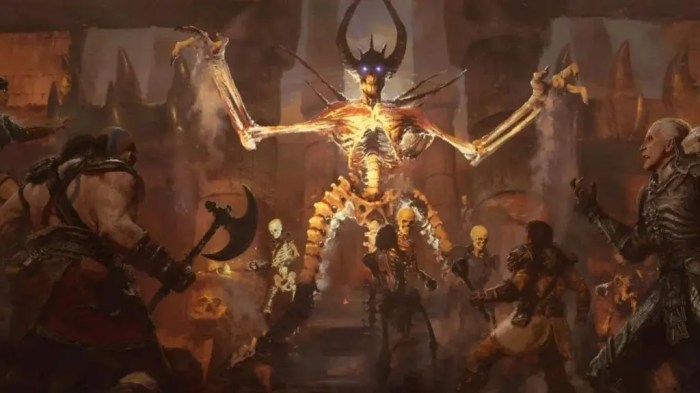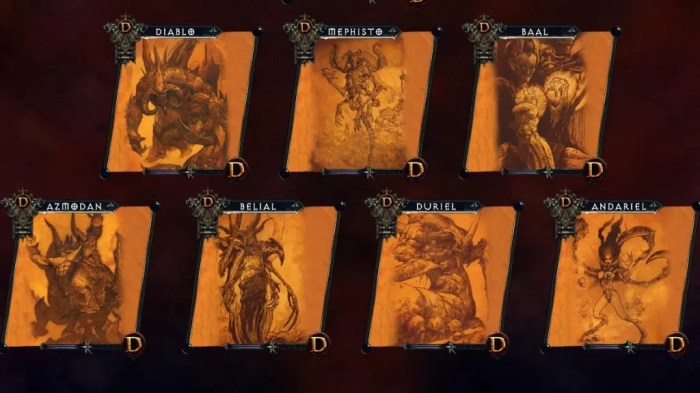Diablo 4 Prime Evils: Unveiling the Malevolent Forces of Sanctuary. The Prime Evils, Mephisto, Baal, Diablo, and Lilith, are the embodiment of pure evil and chaos in the Diablo universe. Each possessing unique abilities and motivations, these demonic entities play a pivotal role in shaping the narrative and gameplay of Diablo 4.
Their malevolent influence seeps into every corner of Sanctuary, corrupting mortals and threatening to plunge the world into eternal darkness. As players delve deeper into the game, they will encounter these formidable foes, testing their skills and courage in epic battles that will determine the fate of Sanctuary.
Diablo 4 Prime Evils: Introduction
The Prime Evils are the central antagonists of Diablo 4, representing the embodiment of pure evil and chaos. They seek to corrupt and destroy Sanctuary, the world where the game takes place. Their motivations stem from their inherent nature as demonic beings, driven by an insatiable desire for power and destruction.
Mephisto, Lord of Hatred

Mephisto is a master manipulator, specializing in manipulating souls and spreading terror. He ranks second in the Prime Evils’ hierarchy and influences the mortal realm through his demonic minions. Mephisto’s interactions with Baal and Diablo are marked by rivalry and deceit, as each seeks to outmaneuver the others for control.
Baal, Lord of Destruction

Baal’s destructive powers are unparalleled, and his relentless pursuit of chaos knows no bounds. He employs cunning strategies to achieve his goals, often manipulating mortals to sow discord and weaken Sanctuary. Baal’s relationships with the other Prime Evils are complex, marked by both cooperation and conflict.
Diablo, Lord of Terror
Diablo is the cunning and manipulative leader of the Prime Evils. He excels in deceiving and corrupting mortals, using their fears and desires against them. Diablo’s ultimate goal is to control Sanctuary and plunge it into eternal darkness. His interactions with mortals are marked by deceit and manipulation, as he seeks to use them as pawns in his schemes.
Lilith, Mother of Sanctuary
Lilith, once an angel, is the mother of Sanctuary and a formidable force in her own right. Her origins are shrouded in mystery, and her connection to the Prime Evils remains unclear. Lilith’s powers and motivations are unique, and her role in Diablo 4 is still shrouded in secrecy.
Prime Evils’ Impact on Gameplay

The Prime Evils play a pivotal role in Diablo 4’s gameplay. They appear as formidable bosses, each with their own unique abilities and mechanics. Defeating them requires careful strategy and teamwork, and rewards players with powerful loot. The Prime Evils also influence the game’s narrative, providing a sense of progression and shaping the overall story.
Prime Evils’ Visual Design

The Prime Evils’ visual designs are a testament to their demonic nature. Their appearances are grotesque and terrifying, with intricate details and animations that convey their immense power. Their visual presence adds to the overall atmosphere of the game, creating a sense of dread and immersion.
Prime Evils’ Voice Acting
The voice acting performances of the Prime Evils are exceptional, capturing the essence of their characters. The actors deliver powerful and menacing performances that enhance the characters’ personalities and motivations. The voice acting adds depth to the game’s narrative and creates a truly immersive experience.
FAQ Summary: Diablo 4 Prime Evils
Who are the Prime Evils in Diablo 4?
The Prime Evils in Diablo 4 are Mephisto, Baal, Diablo, and Lilith, ancient and powerful demonic entities who seek to corrupt Sanctuary and plunge it into chaos.
What are the unique abilities of each Prime Evil?
Mephisto manipulates souls and commands terror, Baal wields destructive power and chaos, Diablo deceives and corrupts, while Lilith possesses unique abilities tied to her origins and motivations.
How do the Prime Evils impact gameplay in Diablo 4?
The Prime Evils appear as formidable bosses, challenging players with their abilities and mechanics. Defeating them grants rewards and shapes the narrative, providing a sense of progression and accomplishment.
